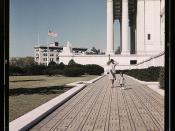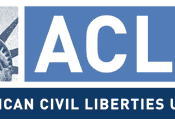The Supreme Court case of Reno vs. ACLU was a pivotal case in American History. It took place in 1996, and was the Supreme Court's first case dealing with the issue of cyberspace. The case involves the Communications Decency Act (the CDA), which makes it against the law for minors to view "obscene or indecent" messages or images on the Internet.1 When the president signed the bill, the American Civil Liberties Union (the ACLU) filed a suit against the CDA.2 The ACLU is an organization designed to protect American citizens' civil liberties, and it felt that the CDA "effectively suppresses a large amount of speech that adults have a constitutional right to receive and to address to one another."3 The ACLU argued that the Act went against the First Amendment, which protects "the freedom of speech."4 Attorney General Janet Reno disagreed, saying that minors must be protected from harmful material.
Reno argued that the CDA actually protects First Amendment principles by censoring the Internet rather than contradicting it.5 The Supreme Court ruled in favor of the ACLU, and found that that the CDA was unconstitutional.6This case was pivotal in our nation's history because it established that "the freedom of speech" applies to the Internet. Not only was it the first Supreme Court case involving cyberspace, but it made it legal for a person to post anything that they want on the Internet including obscene and potentially hurtful material. Because the Internet is something that many Americans access on a daily basis, this court decision plays a large role in the everyday lives of millions of Americans.
With communications web sites, such as MySpace, Facebook, and Twitter, (all having millions of users) people have the right to post anything that they want onto the Internet, even if it is potentially harmful...



Reno v. ACLU
This essay contains many statements that, while not entirely wrong, are plainly inaccurate.
Reno v. ACLU was not a "pivotal" case. "Pivotal" implies that this case changed the direction of the law in a significant way. In fact, the courts have been very consistent about the first amendment, and this ruling is entirely in line with the courts' position.
The American Civil Liberties Union did not bring suit against the Communications Decency Act; it brought suit against the Attorney General as the senior-most governmental official charged with the enforcement of this Act.
The Court's decision in this case did not make it legal for people to post freely on the Internet. People had had that right since the Internet was first established. It did preclude the government from barring some Internet traffic through the specific device of the Communications Decency Act.
On the other hand, there are many ways that Internet traffic can be controlled. If harmful material is posted, persons harmed can still sue for defamation. Bullying and threatening people is subject to sanctions, just as it would be in any other forum or in live encounters.
As to the notion that the Communications Decency Act "could have easily prevented many rape, murder, and stalking cases involving the Internet," this is nothing but rank speculation, unsupported by any showing of facts.
In short, this essay undertakes a very ambitious task, but falls short of success.
0 out of 0 people found this comment useful.